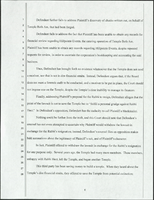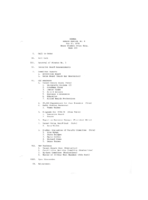Search the Special Collections and Archives Portal
Search Results

Transcript of interview with Anna Sipl Meyers by Leita Kaldi Davis, February 12, 2012, February 29, 2012, March 27, 2012, April 6, 2012, April 24, 2012, May 3, 2012, May 9, 2012, May 16, 2012, October 19, 2012, November 16, 2012, & December 7, 2012
Date
Archival Collection
Description
From concentration to ownership of Las Vegas casinos, Meyers owned the Cashbah and the and Queen of Hearts in downtown Las Vegas. Interview dates: 2/12/2012, 2/29/2012, 3/27/2012, 4/16/2012, 4/24/2012, 5/3/2012, 5/9/2012, 5/16/2012, 10/19/2012, 11/16/2012, 12/7/2012.
Text

Interview with Kenneth Giles, February 10, 2005
Date
Archival Collection
Description
Text
Thomas Hickey Political Papers
Identifier
Abstract
The Thomas Hickey Political Papers (1964-1996) contain the professional files of Hickey’s career as a Nevada State Assemblyman and Senator. Materials include constituent correspondence, voting records, memoranda, newspaper clippings, bills, and research documentation on topics such as the Yucca Mountain Nuclear Waste Repository, the Equal Rights Amendment (ERA), education, health, prisons, finance, and Nevada infrastructure. The collection highlights Hickey’s role on committees including finance, transportation, government affairs, and ways and means.
Archival Collection
John Levy Lighting Productions, Inc. Records
Identifier
Abstract
The John Levy Lighting Productions, Inc. Records (approximately 1990-2022) contain correspondence, invoices, contracts, expense reports, newspaper and magazine clippings, photographs, slides, and digital files detailing the development of various projects primarily in Las Vegas, Nevada. The records also contain architectural lighting drawings, electrical schematics and design details, conceptual sketches, and artist renderings of projects in Las Vegas, throughout United States, and various international locations.
Archival Collection

Angela Castro oral history interview: transcript
Date
Archival Collection
Description
Oral history interview with Angela Castro conducted by Stefani Evans, Cecilia Winchell, Kristel Peralta, Vanessa Concepcion, and Ayrton Yamaguchi on November 05, 2020 for the Reflections: The Las Vegas Asian American and Pacific Islander Oral History Project. Castro begins the interview by talking about her early life, childhood, what Guam was like, and the history of her parents and grandparents. She describes the difference in public and private education in Guam and compares it to the United States. She explains the reason why she moved to Las Vegas, Nevada in 1998 and attended the University of Nevada, Las Vegas for public relations. Castro then talks about the differences between older and newer generations, the political atmosphere in Guam, and the differences between the United States and Guam in politics. She also talks about the discrimination she has experienced throughout her life and diversity in the workplace. Lastly, she describes her culture and traditions during holidays, the struggles with an absence of culture within her family, and her personal religious beliefs.
Text

Amber Diskin oral history interview: transcript
Date
Archival Collection
Description
Oral history interview with Amber Diskin conducted by Barbara Tabach on January 5, 2018 for the Remembering 1 October Oral History Project. In this interview, Amber Diskin discusses her experience at the Route 91 Harvest music festival during the October 1, 2017 mass shooting in Las Vegas, Nevada. Diskin talks about finding her way home after escaping the crowds and letting her family and friends know she was not hurt. She speaks of the aftermath of the shooting, including how her children were affected, the post-traumatic stress disorder she developed, and how the shooting has affected her love of concerts. As a native Nevadan, she shares her views of Las Vegas and how her sense of community deepened after this event. Diskin ends the interview by discussing her appreciation for the first responders and the gift baskets she helped distribute to hospitals, police stations, and the fire department.
Text

Astrid Silva oral history interview: transcript
Date
Archival Collection
Description
Oral history interview with Astrid Silva conducted by Monserrath Hernández and Barbara Tabach on April 22, 2019 for the Latinx Voices of Southern Nevada Oral History Project. Astrid Silva was born in Gomez Palacio, Durango in 1988. She immigrated with her mother to the United States in 1992, where they were met by her father before flying to Los Angeles. She recounts her first impression of the United States and her families eventual move to Las Vegas, where she describes her time living in Las Vegas' west side and struggles she faced being an undocumented student living in Las Vegas. She describes her first meeting with Senator Harry Reid and the friendship that developed afterwards. She has spoken at the Democratic National Convention and has been vocal about her status as a Dreamer. She is currently the Executive Director for DREAM Big Nevada which was established in 2017 in order to provide aid to Nevada's immigrant families. She writes about her hopes for Dreamers and her continued work in expanding the ways that immigrant families can be helped in an always changing political climate. Subjects discussed include: DACA, Dreamers, Immigrant Rights, and Higher Education.
Text


Meeting minutes for Consolidated Student Senate, University of Nevada, Las Vegas, May 30, 1978
Date
Archival Collection
Description
Text
Dorothy Dorothy Papers
Identifier
Abstract
The Dorothy Dorothy papers (approximately 1913-1986) document the life of singer, songwriter, columnist, pilot, and farmer, Dorothy Dorothy. Materials contain genealogy records, correspondence, business and organizational records, local history, sheet music, artifacts, and two boxes of photographic prints. Also included are materials relating to her active involvement with animal rights campaigns.
Archival Collection
